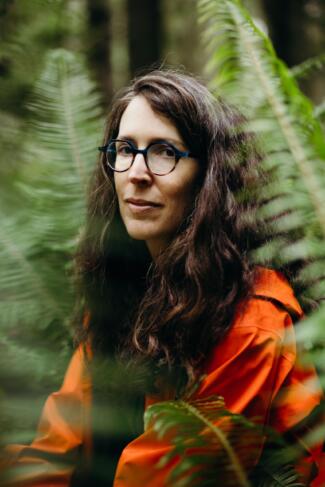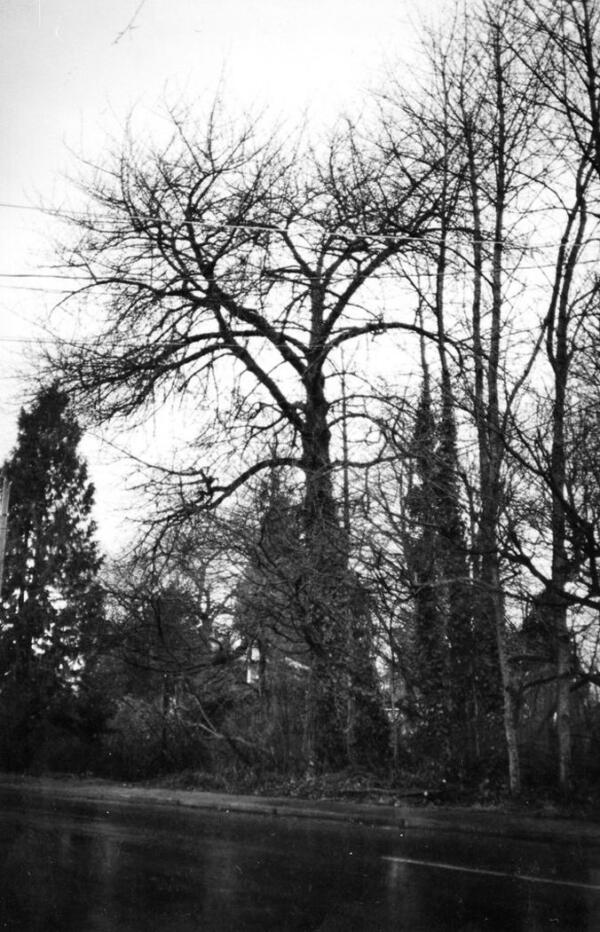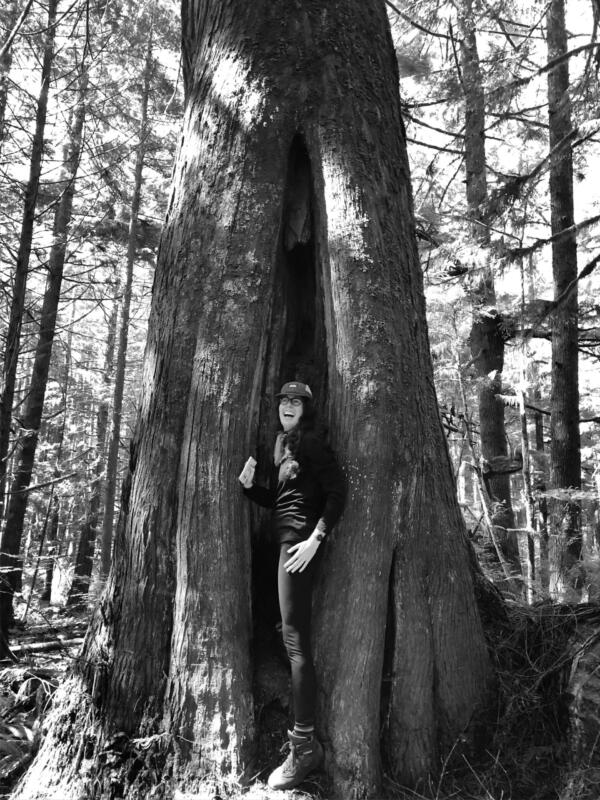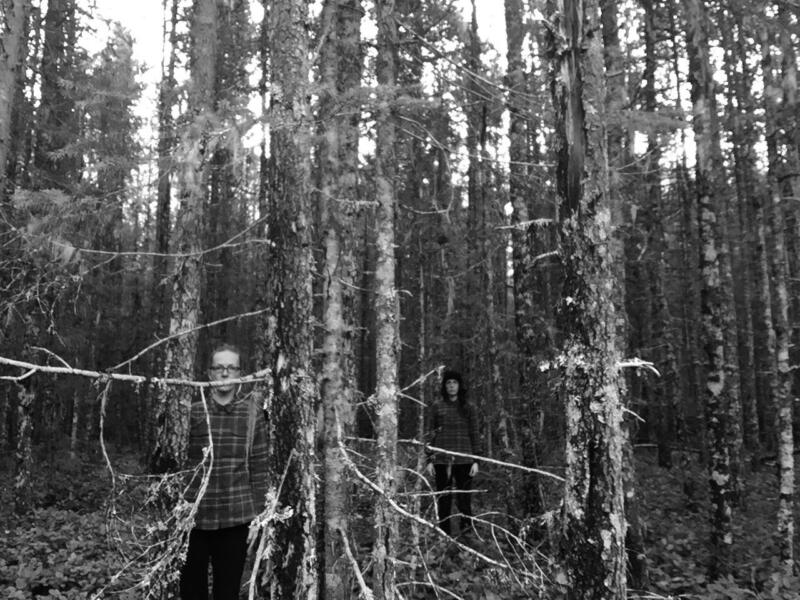1963 A quest for Champions
Tracking Giants: Big Trees, Tiny Triumphs, and Misadventures in the Forest
by Amanda Lewis
Vancouver: Greystone Books, 2023
$24.95 / 781771646734
Reviewed by Ginny Ratsoy
*
![]() As I write from our province’s southern Interior, amidst the worst air quality in the world, I find I must state the obvious. The lessons Amanda Lewis accrues in her quest during “the hellscape of 2019-2022” couldn’t be more germane: trees are vital to our survival. Few among us would deny that deforestation upsets the ecosystem; it is connected to everything from air quality to soil stability. In the few short years since Lewis began her mission to connect with the 43 Champions (the largest trees in their categories) in our province’s Big Tree Registry, terms like “heat dome” and “atmospheric river” have morphed from virtually unknown to commonplace among the lay population.
As I write from our province’s southern Interior, amidst the worst air quality in the world, I find I must state the obvious. The lessons Amanda Lewis accrues in her quest during “the hellscape of 2019-2022” couldn’t be more germane: trees are vital to our survival. Few among us would deny that deforestation upsets the ecosystem; it is connected to everything from air quality to soil stability. In the few short years since Lewis began her mission to connect with the 43 Champions (the largest trees in their categories) in our province’s Big Tree Registry, terms like “heat dome” and “atmospheric river” have morphed from virtually unknown to commonplace among the lay population.

Part memoir, part manifesto, and part (mis)adventure/chronicle, Tracking Giants meanders through the personal life of the author and the literature on forestry as it meanders through the BC forests themselves. Balancing the personal and the small-p political can be tricky: too much of one risks self-aggrandizement or mawkishness; too much of the other virtue-signalling or stridency. Lewis avoids both extremes. Like all good creative non-fiction, the book borrows from the techniques of fiction, such as plot, rising action, climax, and denouement, as it relates the journey of the protagonist from inception of action to resolution. At the same time, this narrative subverts tradition – both through unconventional plot turns and welcome (often self-deprecating) humour.

What would prompt a city-dwelling book editor with considerable hiking experience and a penchant for collecting and sorting, but average camping skills and a central vision of trees as “blocks of pulp on a shelf,” to undertake the massive project of visiting, measuring, and updating data on trees registered as the biggest in their category—in just a year? For starters, Lewis was attracted to the silver maples outside her apartment window and had a desire to get out of herself and a sense she was playing life too safe. Moreover, she couldn’t resist following up on a friend’s suggestion, and perhaps above all, she was extremely naive about what she was getting herself into.
Relying roughly equally on experts (both primary and secondary sources) and her intuition, Lewis begins by colour-coding the trees according to their proximity to her East Vancouver home. In search of the Scouler’s willow growing near Jericho Beach, she narrows things down to two trees, and “guesstimates” which is larger. Even with this apparent initial success, our intrepid explorer is aware that she needs more equipment, preparation, and consultation with experts. Nevertheless, when she moves on the next day to the bitter cherry – driving to the base of the North Shore Mountains and hiking for over an hour – she spots it. Beside a curb, surrounded by garbage and minus two limbs it had had when it was last recorded 18 years earlier, the bitter cherry illustrates a recurring theme of Tracking Giants: subject to the vagaries of nature and humankind, all trees are mortal. Even Champions are not protected nor designated with signage. Proud of her urban “finds” but not experiencing the transcendence she had anticipated, Lewis is confident the feeling will come when the stakes rise and she spreads out from the Lower Mainland.
As her quest continues, Lewis learns how much she has to learn – not only about finding Champions, but also about circumstances beyond her control, and, of course, about herself. Most saliently, a three-week road trip, as literary road trips are wont to do, provides hard-won enlightenment. Her travels to Vancouver Island and northerly coastal areas do not result in the planned dozens finds. Reality intervenes in various forms: her inexperience at measuring, her fear of off-road travels, a bear encounter, and wildfires. What she has learned, though, is that practising tree measuring is vital, understanding a Champion’s context is necessary, spotting orcas and humpback whales and immersing oneself in hot springs are important parts of the journey, and modifying her expectations is in order. When the pandemic intrudes, and self-survival replaces Champion tree finding, modified expectations become imperative.

With experience, Lewis finds a new vision replacing her obsession with production, completion, and personal transformation: she focuses on the entire ecosystem rather than individual trees and integrates her search into her daily life. She also applies her literary skills to trees by reading particular species’ languages and patterns. She comes to revere all trees as she eschews self-glorification and objectification and embraces process and decolonization.
In late 2020, Lewis buys a log house on Gabriola Island, which has its own independent, big tree registry. Her relationship to trees intensifies as she uses firewood to heat the home and she realizes her project has changed her, although not in the exact transformative way she envisioned. In her new perspective, one’s insignificance is to be revelled in and one’s community relished. Interaction with trees becomes a creative hobby — a practice, not a goal.
The communal aspect of tree finding is reinforced in late winter in Ucluelet. As she realizes failure teaches as much as success, she acknowledges the importance of sharing the former with her colleagues. In addition, in an area of cultural significance to the Ucluelet First Nation – where trees are protected – she and two friends find the runner-up hemlock. The friends marvel at it as they record its data for the Ucluelet Nation, and, turning back, find a large hemlock not previously on the registry. The tree is an old, gnarled survivor, and Lewis is delighted when they decide to co-nominate it. Near Port Alberni, when they stop to measure a giant western red-cedar, Lewis looks at the forest before her and envisions its history. In more ways than one, the whole is greater than the sum of its parts.
Perhaps it is unsurprising that the bibliophile gravitates from quantitative measures to qualitative ones; from competition to cooperation; from the Western heroics of conquering to Feminist/Indigenous models of community.
More than the memoir of the growth of an amateur tree tracker, Tracking Giants: Big Trees, Tiny Triumphs, and Misadventures in the Forest is very much an instructive account of its time. The book is also at once embedded in the British Columbia landscape and a microcosm of the roiling global village.

*
 Ginny Ratsoy is Professor Emerita at Thompson Rivers University, where she created and taught a course on the environment in Canadian literature. Her scholarly publications (co-authored and edited and co-edited books and numerous peer-reviewed articles) have focused on Canadian fiction, theatre, small cities, third-age learning, and the scholarship of teaching and learning. In addition to counteracting ageism by maintaining a growth mindset through activism, freelance writing and community engagement, she promotes later-life learning through her involvement as a board member, coordinator, and instructor for the Kamloops Adult Learners Society. Editor’s note: Ginny Ratsoy has recently reviewed books by Gregor Craigie, Iona Whishaw, Elizabeth Bass, Karen L. Abrahamson, & J.E. Barnard (eds.), Gregor Craigie & Kathleen Fu for The British Columbia Review.
Ginny Ratsoy is Professor Emerita at Thompson Rivers University, where she created and taught a course on the environment in Canadian literature. Her scholarly publications (co-authored and edited and co-edited books and numerous peer-reviewed articles) have focused on Canadian fiction, theatre, small cities, third-age learning, and the scholarship of teaching and learning. In addition to counteracting ageism by maintaining a growth mindset through activism, freelance writing and community engagement, she promotes later-life learning through her involvement as a board member, coordinator, and instructor for the Kamloops Adult Learners Society. Editor’s note: Ginny Ratsoy has recently reviewed books by Gregor Craigie, Iona Whishaw, Elizabeth Bass, Karen L. Abrahamson, & J.E. Barnard (eds.), Gregor Craigie & Kathleen Fu for The British Columbia Review.
*
The British Columbia Review
Interim Editors, 2023-24: Trevor Marc Hughes (non-fiction), Brett Josef Grubisic (fiction)
Publisher: Richard Mackie
Formerly The Ormsby Review, The British Columbia Review is an on-line book review and journal service for BC writers and readers. The Advisory Board now consists of Jean Barman, Wade Davis, Robin Fisher, Barry Gough, Hugh Johnston, Kathy Mezei, Patricia Roy, Maria Tippett, and Graeme Wynn. Provincial Government Patron (since September 2018): Creative BC. Honorary Patron: Yosef Wosk. Scholarly Patron: SFU Graduate Liberal Studies. The British Columbia Review was founded in 2016 by Richard Mackie and Alan Twigg.
“Only connect.” – E.M. Forster
3 comments on “1963 A quest for Champions”